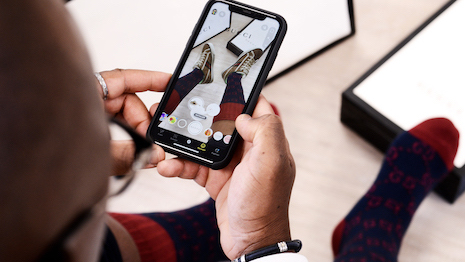NEW YORK – Digital engagement and values-based strategies will be vital for brands to reach the consumers of the future.
In a keynote presentation at the Future of Luxury eConference on Sept. 23, an executive from Forrester Research discussed how consumer behaviors have evolved since the onset of the coronavirus pandemic. Empowered consumers are growing to expect more brands, becoming both selective and experimental.
“Consumers expect comfort and innovation,” said Fiona Swerdlow, vice president and research director at Forrester, New York. “That really is shaping the future of consumer buying.”
Future of Luxury eConference was produced by Luxury Daily
Empowered consumers
Today’s most empowered consumers can be defined by five characteristics: a willingness to experiment, device usage, digital and physical integration, information savviness and self-efficacy.
A growing number of consumers are comfortable with trying new brands and products, relying on brand and product information, including peer reviews, to make purchasing decisions. As they rely on an increasing number of devices for everyday tasks, consumers are also expecting seamlessness between channels or touch points.
Increasingly, consumers are buying from or avoiding brands based on the values they perceive those companies have. About two-thirds of online adults in the U.S. and Europe report regularly buying from brands that align with their personal values.
In light of the COVID-19 pandemic, more consumers will make efforts to buy from brands that reduce environmental impacts, support local communities, treat employees well and protect their personal data.
Over the next 12 to 24 months, consumers will continue seeking buying and delivery models that are both traditional and innovative.
“We see customers telling us they do plan to engage with brands more digitally, but they also expect to spend time shopping in bricks-and-mortar stores over time as well,” Ms. Swerdlow said. “We're not all going to become necessarily hermits and never, never leave our homes and do everything digitally.
“The point here for retail and for luxury is that even our most empowered customers really want the best of all these worlds,” she said.
Ultimately, Ms. Swerdlow explained, convenience dictates whether a shopper decides to buy online and pick up in-store, shipping it directly to home or other fulfillment options. Being able to provide these options will allow brands to build relationships with consumers.
B2C trends
These changing consumer preferences and priorities will change the future of B2C shopping.
Forrester predicts that by 2023, two-thirds of global ecommerce will take place through online marketplaces. Some brands may expand their distribution mix, while others will be able thrive outside of marketplaces and remaining more exclusive.
Ecommerce giant Amazon has recenlty launched its luxury outpost, as it makes another bid to become a trusted destination for high-end shoppers as online shopping thrives in a post-COVID world.
Luxury Stores is now available by invitation-only to select Prime subscribers in the United States, creating a sense of exclusivity although there are more than 150 million Prime members. Luxury label Oscar de la Renta is the platform’s launch partner, with more brands debuting in the coming weeks and months.
Now, as physical stores continue to struggle due to the coronavirus pandemic, it may be an optimal time for Amazon to strike. Additionally, online luxury platforms, such as Farfetch, Moda Operandi and Net-A-Porter, have significant but fragmented affluent audiences that pale in size to Amazon’s (see story).
{"ct":"aONJ\/n\/W4fymDsyYbWy6qghd87mkuyovt4At\/lp1wzFO43LIqnlOCzZIYkrXjVSEF0ih7nwavFW8t\/T1MIYvCAEbsvFJKh4givqCK6Xi8Dr8JYQNPXHh0OSWmePa7eRzR2CKJLAFbIw8OLH7T+0ihyj4KNXhtQXCW8DHVodt0UwT7pn17HD0Jc5yTNZAFWll7S9nLRZ7ajrdxzWJRz0lhOfvTIEBYb\/kw6maWzOsV1WbTIAHibKxdz6V3nhpngo73TMB2ACQyEVmt9v94y9Zfvq+cSMpkaSZBnt0O0xSR6Hd6n8ICQaO8TxLLXrhvqarWhchvd5t9Y8Bb2j+J3G+sGwPES+e6zgj0gYjLjKDCxtb6THNiqj\/a4MDC+DRWIGlBF36l4421fAMdEh6kr4iy5t6Fek9oJydMkC+sB+j4CEJB2KofR\/CBrGyTH5R2WRphw4MEa0xDorjm\/QUNHk5x942SMlnm5e6Y0tb+TezPGxuNjILFm6GRx\/2G+0p4E3TGT1Kr8oT6ziRdb9pnOfAWTht0D8UQEoz2TqIl4sPSc6Hqo1EIrm0PeQr6jTQ22G0nmj6c6oLLPH0l9xOhFt2GILZ6fyQkyEQmR1lNdiwnv246d5aG0CX8gTVMItK13F2ZGfOUjqrUyDPy8LYJYdpxYOP6PLRjV0JHGcPeLlVKLDrluhoAjExweNKUDQhFNr3RXAMZrd\/I\/KD4NybQV8w6qcADNAHsIxti2RGpgqNlyHjM01tSd9k3PYawOrF4VsgYwRsjpDKGya7GEYKK8xksIkfgODD\/mxAYQtOxLvSdhDPg18KJ0rMWtdGGyJPSqtQIQyW5jc+\/dZIXyei3PdVsouTUOi1mT+DZK2zCoeE8MnnENncYFj28BBxxlxA5R6+m4slH6dN6L8xecnL3IhpnobTd14xJnKqURtSBU5It8WOEeg2G1B2XWJGr5E6hcJZvYoqLD9V1p\/lCoZTutJQsUygO6z21AFPwNqEJb\/xI+3Q9w\/ZLk8O9M+UomwPT3WwAERvTrpXuDWg3HeHFJ2ZAMPpgEQ\/o7tpJ63SXja78dFZKeLAplLPYb3aEcFEQEdj3KPWXGiw3ia0jJDFh6tg+JibeGFemM5o5bbarShuCjrVCvphHrX8RVd78A8izJOzmMJ3YwfIBpQpCuRvoKLWH+gn3GdyayDwz5CeApLAzgP9LT8mEtGWNR2BJeOAI2TSIARwhw+v87g1Ua12WBCcHvMp4dpmhAxMf2Nuu03z9iyAOcOMhLna4MRRlrgJMrIlLJo0Wk4gEwS6P4EdRIixIoZ9xhwtm8r17IdPCEpugxmHZBq5aXOJYTSbDC5HpfG9b2UsdqjNVrW44m8SlOrDAOyZ19y3PG+timBhOIT3rBCi6f2JS\/VOWiyDgj\/pSJxjJZ8hTVeECMA2KRiTHPBvSQ4og0Znq9QI2\/E89z4O2jg6n2GyqTuxByMddPeUcYZ1dCKgWmssDfZ7hJWfdGJ5cojQfgI\/licD0k8E05MWyyrmeIeWqDa0z3swpPCcp7myAIKNmUpqnyh\/klTj+iiIeWigfCj0Z6s0PQUjG8jsViAxTr1bGHkz\/VUUxfyju3EngZ4bY1p8yRPBOGSiO12+pf7lxDMFWY8R66wYrVk4krn5+E9\/wKHtqpmPNxwqMbXt8211ym8hewb4GcTAYXs9KPpHoi3jgl0tBCyjJDqU7cvdkMaprRgma7TU4zeLN0O9fv9LAb+wtdMXWrcLFItY0c+urh7mv7PI9pIKUzQhhjSDU21QNBfc1DpBj8s8CMfpkVBQFUv72oTBJFXrUbw5D4UJWlCh50dH+K9ab5CKGz2xvyak9ieASCstBmG4ZsEj2siopj\/sKtzsgo\/sSs3FV67GsUy9GQZlwL+kTUG6PLLuV0zvXTmyMvp4YwjR4nbhnIFFbhih3FgRkfsV1pUGPF5a10d9SuZ+ginqO6LWE3m7b8qy4POrWREfEDCS9FQzRhDVMcIAL5WWOGSez1P\/GL+N6S9gC3oJRYXAax585eqZ4CRdqzqH7iope1ZUxzvHgHVIOCeUvChfoJo3dpDaIbRuqwcluWNLTUxMefoMuOLLqvZ+WpinrbEkfP3p4lCfG3EqDEKyn8Nvtg4FvkkKDW1Fb7eWhpN6GRcsrX553AedlqDsyHBTzPQDV0H5QNSu7vyje6iWlCmwXQB5VyEbhP801PA8nput3RSNqJypgJp\/+X7vIYlU7TlI6GT9kH2ISo++TN9S2YRVjZxty1OKoCgqvAwwrP+Pxqf0kZthhldV5nE\/6EVW7FI4QOEHX36f\/1D9K9VCjp3\/2V33BQShZ6EVtRUadK278R61QGCVBmKzC4urOkLaG8KwTr4wYlq0i7x5aogIKUrwxaiBDRDJeJufPBjSRmZjn1t3t4kjYiAPTxnm0virGlQODdjkzGUF6p3t8dkngEbYrLMcyKgVi+CISiTgodFb\/X7DOK\/KAAw1IzAjnslkSBfHFnG8\/xjzEGu\/jpG\/T0QTt1K2Q774HEX93giqzLfCMKTTGyMmvRl3\/uiDpa05ci6N\/NvxqtWtvFyw\/t1HKfLBMhWhkhiiEhlY48ealJsSGndJ+XediGjsCjIhttRE9Dd8Bl319e8JBz4RBRyuOOigR3i1BIo4\/B+SHTI1ziFkNvi\/NuGGgv4MniAwAkZgv5mt0RN5wOFiJ65PtaIFSWUmS8+4B1RlGlv2c4uD43e4DCo4WD3yjm5Ygc65jcu6SqKhvE8U\/sSS8kmalbJfoIk1F3k0kOa8phla4hE6e6TW2xW36IYgookKDtVaVmHLfKkm2m9PKOwGZnRtxmCjYoCQ71u\/zXqLBcSdbG+NWfavIFlO5NSB5TXIZVILpRnqqytU272W\/AxfG3JhLG4HkRSG9E6z0T60H4xaYS487bvQ3k8derOrGiNjuOqasmQHya5Hyjp2DNAB3QnqFdY\/xSCuFBOggFS71lSP\/JZ3oNYX0URqMLHB94dcibsK2jE4DAW3y0Djyn5bu5kibXd\/mj5q3GpzQWxpqTLk9RtuMC1jBTwTviDx+DMZQn8Tb\/af+BTZkYgBwVgA5RVweAkcNzFk7j39YAXFib2uNwCYlX9LnNskHR2005+lsSax3wOsl8lkYDBL9yrI2KsANuo6EHfxJrH8Fc6HOlK1cForPdSp0gKQlgsxLbZMiYnbWlR0m8t\/e\/7M9x74yGFyYkaPhXrudMN3JZPBrlKg3Wn1iYZauyDF61UzKB1tP4M2LFunPFhvlsHF+DJAmrysqRguVVLC5jYnnqTc1pQ4vKi318l5vYhT3yLuZAhYFJwuk1Z5PZUKGDGUvuOfJxvNkHVi6dNE2JHZBJHxbmj4dViA2DOD7VzPSWlk\/7X714yJR3Um25jCdQEcIkKHpoYT5\/6KIUXlzC\/qGM7lNN+gNepJLIQDjIzV1fLiLJkLfRIqUzs6lYkZb6GmPUlngtNvt4M04gUVVpvsmvA4zoijhYvIat46xMGOASswfS3Ccb63gGoQHglLfkxmwJhIcr9NoGvNootbyjzxERYAJYFjJoFsIU1nlBhH43a1my95x72CmBFRjInSjM1D+gV\/ltjwJr8D3gQKd1diEMALM41vgQXevFZRzGEN2quK7D0N\/EoRXrsTXz7+s72tgrCXp+IrxnKCmNIXHT\/\/03npplyPpxofi6XgDAlZfSRVINjGJxCJjWA4yBKPYLy1gDW89920e\/fV2Ka4uQSOrHMgPX5sZ56tkyVC88edIxlX1A8CYECO6zJXLB2e4ghqt+VGO5SPE2ivnCnrhPv79emETonjZ+JtQXhEYxFTOcRZkjjKBvFXiUQ8MAAzSwfRFJ3w93tBdw6kZ9WY8E4EDg52noOjlO5MC3WpV27vWkKykq0Fxo3Cx71ddsIf+czREL8ud2V1R1GdvaXkFp9vgAHVVFd6nLa7uMWncCO3kwtxqWe3xln\/P1ek0+B1IM8K8Q\/OwvatZ2Skxmd7KD5EITUDMEza9pNPUPBNTPDByDWibUnFWrvnHy2P3TyMb2ABpqd126CmpHnuI\/B1H1ugoUxR7ak43FRY8vXeSm\/v67fgVlJmivxBTbo9BP2BbgNZxhwsWEHqVqlFvV6bObXFi7ZznzW+PQm1lCyP4JHJeZz7bmFjA9XxVTKzOU1Uw4bZjiu002oHy6HE4TxV+QIFaDatSAfqieMBLL0hPApxQoosJuuTo\/7fArZAMlBx7\/BPqY5t4THpCucZEFGpsym20kwwWI1H5V7Mm7x5cQVQ8qT\/D6Skf+SvEW8J4MOL4XUTO86QHOk3TSwNbZl5bgBVtcgq4KduurKMn5N87I9DwQoSfjZ5cnIM879LH9A1qDbmpqT4PG6IGfltRBqA4UBzJVi82flPTpPqo2Ox1oL4QM7SZsnqnfA\/XysXnvXLCZRpZ0wx4K5+1s9KDxZWmhd+0Qe6JtzmsXY5ruLZIPOzCfAtRSZGeaFwPvdLcNSO0EKV34sSt7GFMITwOAP0d3FCSYchIJxseyGK++Mo2X9Dc05jkHAPEE3YUOQLDbvPVlIOmqWBdP+bMuZHnC9pZYEQPIPQvYC2WuTJqyy6jp7bbGEkZ2MtnGekoNacMPoLPWL5oto6VHPSyk4mVuGzU42r6HBifYBGQdPbhEe0sF\/jd63mLfw3cpsUbEy0QZihy5oJKow50\/YC72H\/nPKyu95rfp19tP+66G9eNP4+adGlXRbwUY5SF\/tQxCtyPV9l7DMENYQadcucLWOSuEN75prbR+zzqG4aZ7q9jUVoK+mU9Dsnr\/laxGtkHLraJPCsb3YXQVzN\/s8uCgL4uGOE\/Ub+hTOReUQMh3rmtcNY\/UWXFR0KmdWs9C1+EDqo3a\/fbtHwD0sj6lwqHlJrR2TUOI31ev98urIiTuyBcZxInOfYuUOfrpeKLKz27ItKc27sGykms2Aebv5zTPnZSAQTnJC1Y4sHKurKw0xlm5+M1JDN5iKefUjuUAWBrNN3EFEYFNwgAlmznSwmLFytbfWclcBzLCX4xDWmse+28NEfceDUelseHcYbAWr+lEEj4KQBZbFuNw27B3UG7bUL9U6HoZugz9rSHSGXHmw2f+LLeYmkYp7PZ3ZPFwfiqIdIpzaK5plqIVdJr7Mtf668Ik2yyW7AAiiYID5NqQkrrLnzKSWdbRBNb5+Gdhsujbe6FDbEFGMPxWiIGR9tbRJMLOf9dWpsioGWdjTx23qVMaEabl9uQIaY3czXy1SCgl6E4XQSO+8I7M6VYf+0R5cSHxmjj5chDGku9QYuPHbSttCwLjShe+4hmCGC6hBolebfwsnP0YGYQIRJIFdxq71E4ApDbXl4EuxYynEZ425blZN1j32P7VFzon+Eotqkvf3v+ikMYtuTXNDPJ+Pnjo7LUpl4YTuMEI7SR+wgMypb6TS0xajqCOb53aP6IlKrnh36ZvacbuuNF232gmsSxZx9yqB331J0qkEEavgK96fa\/NDcOy3mL852cYhqlPWiSERTBvpf7flTmDQAoLG7QAR0DCZeXl92pcmJQsRVyKik+R2exlQW294UJFxsdyTcBrSLDLWVblqLDF6ovFrDy4QWx6KH3roz\/m7+jh6qHYL8PB8YpIdhcAevj5U=","iv":"e4ff2bfaf2dcccd397c84b6c440925d5","s":"bc2539aff33f78d3"}

 Seamless omnichannel experiences are still the future of shopping. Image courtesy of Gucci
Seamless omnichannel experiences are still the future of shopping. Image courtesy of Gucci